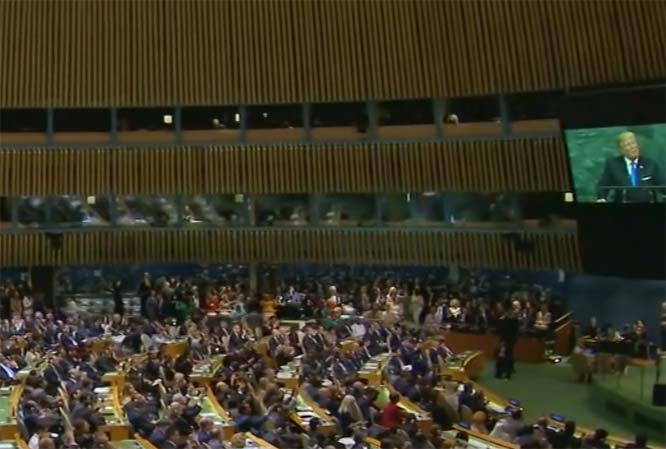
Speaking before the United Nations, President Donald Trump gave a conventional speech artfully disguised as a nationalist provocation.
Trump campaigned as someone who would put America first, a commitment he claimed foreign-policy elites of both parties had failed to make. His U.N. speech might seem to fit with that campaign promise, since he both uttered the phrase "America First" and used the words "sovereign" or "sovereignty" 21 times.
But the heavy-handed emphasis on these concepts didn't lead to any major departure in policy. Trump said America would exercise its sovereignty in concert with allies. He pledged humanitarian assistance abroad. He told the U.N. itself that it was important but had to be reformed, and that other countries had to pay more for its upkeep.
And he threatened action against rogue regimes that pose a risk to American interests -- or even American values. He didn't make the point about values explicitly, but he defended sanctions on Venezuela and possible further action wholly on the basis of its oppressiveness.
The verbiage was unusual, but the underlying message was roughly the same as what any Republican president would have delivered. (More than a little of it was the same as the one Hillary Clinton would have delivered if she had been elected.)
Another president, it's true, might not have bluntly warned North Korea that "we will have no choice but to totally destroy North Korea" if it threatens nuclear aggression. That other president may have been wise to speak with less bravado. But the threat of retaliation has always been our chief deterrent against nuclear attack, and was our explicit policy during the Cold War.
I won't overstate the case. Another president would have drawn a different line on refugee policy, agreeing to take them in rather than just provide funding to help them be settled elsewhere. Only Trump would have denounced trade deals in an address to the U.N.
But you had to look in the speech to see any payoff to Trump's solicitude for sovereignty.
It might seem as though respect for the sovereign rights of other nations conflicts with Trump's continued support for American engagement around the world. A key sentence of Trump's speech worked around the problem: "We do not expect diverse countries to share the same cultures, traditions or even systems of government, but we do expect all nations to uphold these two core sovereign duties, to respect the interests of their own people and the rights of every other sovereign nation."
Trump is trying here to do justice to the dueling truths that most of what goes on in other countries is not our government's business and that we must sometimes intervene. His solution is therefore to embrace a malleable definition of sovereignty. When we don't wish to take action against a foreign government, we can say that we are refraining out of respect for its sovereignty. When we do wish to take action, we can say that the government has forfeited sovereignty by failing in its duties.
Trump even goes on to explain that truly sovereign countries "allow individuals to flourish in the fullness of the life intended by G0D." It's a line that could easily have been inserted into President George W. Bush's second inaugural address, in which the former president rationalized a policy of spreading democracy and human rights around the globe.
In another key line, Trump said that "authoritarian powers seek to collapse the values, the systems, and alliances that prevented conflict and tilted the world toward freedom since World War II." His harshest critics have speculated that he, too, seeks to collapse those things.
But in this speech he pledged himself, as former presidents have done, to the defense of the global order. Somehow that mission became part of minding our own business as Americans. The speech may not have provided intellectual clarity, but for listeners in many foreign ministries it may have provided reassurance.
Comment by clicking here.
Ramesh Ponnuru has covered national politics and public policy for 18 years. He is an author and Bloomberg View columnist.


 Contact The Editor
Contact The Editor
 Articles By This Author
Articles By This Author